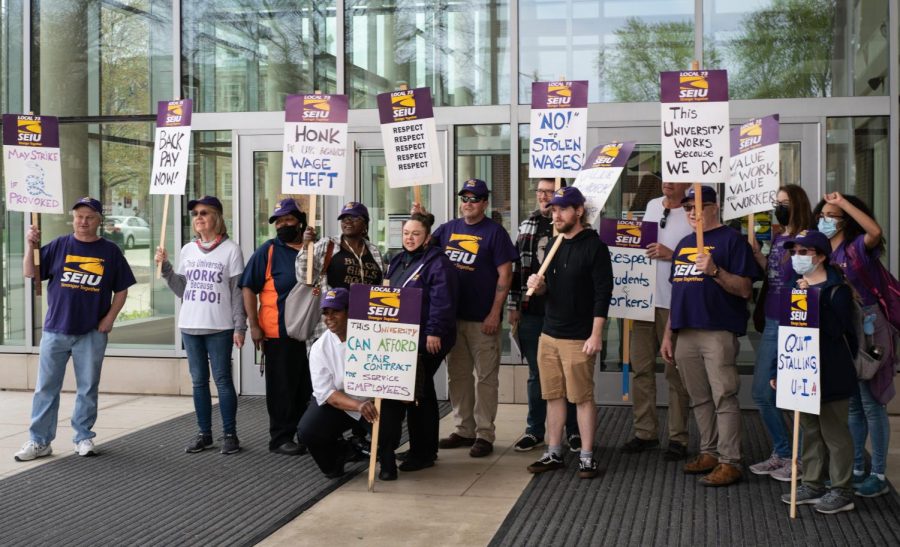UI service workers’ union votes to authorize strike over stalled contract negotiations
Members of the Local 73 of the Service Employees International Union strike outside of the Ikenberry Commons on April 29. More than 50% of the Local 73 group has voted to approve a strike authorization due to no progression being made with negotiations with the University.
May 24, 2022
Frustrated with a lack of progress in their negotiations with the University, Local 73 of the Service Employees International Union voted to approve a strike authorization with 91% of the union voting in favor of the measure.
“This time, it’s an open ended strike — we will strike as long as it takes to reach an agreement,” said Ricky Baldwin, an organizer for SEIU Local 73. “If the University wants to agree with us before that, of course there won’t be any strike.”
Since then, the University presented the union with a proposal on May 17 for a raise of $0.25 per hour, which Baldwin called “insulting.”
“They gave us a proposal — it was an offensive, insulting proposal,” Baldwin said. “It was 25 cents an hour for folks who were here working in person when all the folks on the other side were working from home.”
Baldwin also mentioned the high inflation rate, around 8.3% as of April 2022, and how other jobs in the area pay higher wages.
Get The Daily Illini in your inbox!
“Wages are going up all around the University,” Baldwin said. “You can go to factories, Plastipak, places like that, and you can start at 20 dollars an hour right off the street.”
According to Robin Kaler, associate chancellor for Public Affairs, the union’s previous contract with the University from 2017 to 2019 was settled “with a $0.25 increase.”
“We proposed that amount as an acknowledgement that the parties will settle for an amount greater than 2017-2019 settlement,” Kaler said in an email.
According to Baldwin, increases in fees and deductions from workers’ wages have resulted in some workers seeing a decrease in their actual take home pay over the years.
“The University wants to raise parking fees on these folks,” Baldwin said. “Their health insurance through their employer goes up all the time. All of these deductions are constantly going up. We have folks who’ve been working here for over 20 years, and in the last 15 years, they’ve noticed their actual net take home pay has decreased during that time.”
Additionally, Baldwin expressed frustration at what he saw as the University “delaying” contract negotiations with the union.
“We’ve been trying to negotiate with them since September,” Baldwin said. “They delayed getting started for two months even though our contract says negotiations have to start within 30 days after our initial request.”
In March, several members of SEIU Local 73 requested to speak at the University of Illinois Board of Trustees meeting that month, but their requests were denied because the “proposed topic deals with issues under negotiation as part of the University’s collective bargaining process.”
Baldwin said most of the denied requests “didn’t mention bargaining or negotiations.”
“They wanted to talk about working conditions, waste at the University, things like that,” Baldwin said. “But the University chose to see that through the lens of active negotiations that are proceeding, and so they just denied them.”
According to Kaler, the board of trustees “has a longstanding practice that does not permit the discussion of active negotiations” during public comment at meetings.
As a result, the union sued the University of Illinois Board of Trustees in federal district court on May 5, alleging that the board had violated the Illinois Open Meetings Act and had also infringed on the union members’ freedom of speech.
“We had speakers who went through the approval process to speak to the Board of Trustees when it met here back in March, and all of those were turned down because of some rule that we believe violates the Open Meetings Act as well as the First Amendment of the Constitution,” Baldwin said. “So, you know, in a variety of different ways the University doesn’t seem to want to hear from us.”







